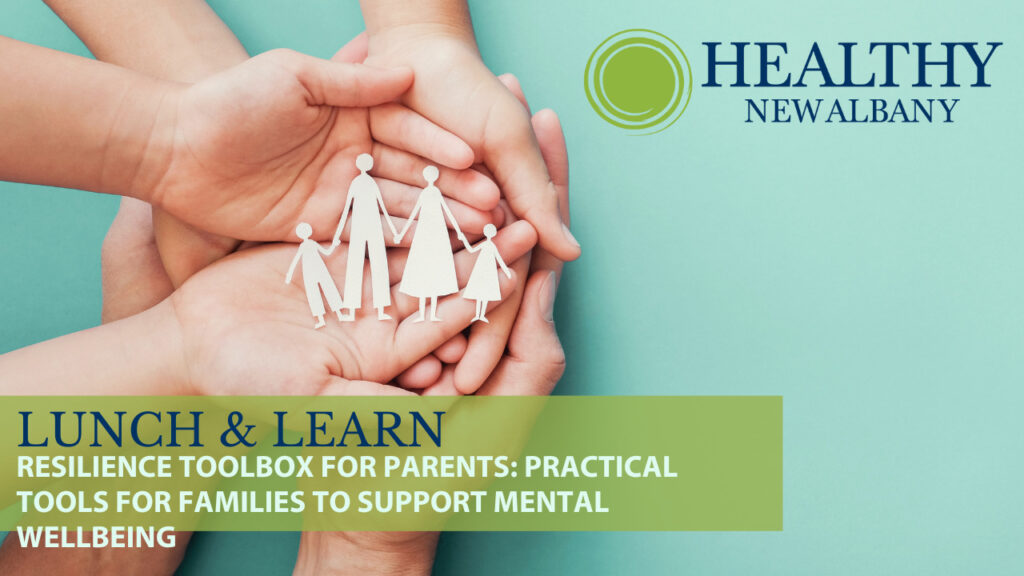
Healthy New Albany Mental Health | Resilience Toolbox for Parents: Practical Tools for Families to Support Mental Wellbeing | October 2022
Healthy New Albany was honored to host a Lunch & Learn on Friday October 21st, discussing the importance of mental health for children and families, and ways for families to support mental wellbeing.
The panelists:
- Achea Redd – Author, Mental Health Advocate & Motivational Speaker
- Michael P. Flores, PhD – Clinical Psychologist Nationwide Children’s Psychiatry Hospital
- Moderated by Angela Douglas, Executive Director of Healthy New Albany
Jessica Bennett, PhD – Founder and Director of Mindful Literacy Columbus – was also scheduled to be a panelist, but was unable to attend due to illness
The Importance of Mental Health / Key Stats
- From 2009 to 2019, the proportion of high school students reporting persistent feelings of sadness or hopelessness increased by 40%; those seriously considering attempting suicide increased by 36%.
- Between 2007 and 2018, suicide rates among youth ages 10-24 in the US increased by 57%.
- Since the start of the pandemic – rates of anxiety have doubled; rates of depression have doubled
Nationwide Children’s Hospital is seeing more children in need of mental health services and parents unsure what to do (and everyone is stretched thin).
Data from NCH Psychiatry Department:
- Increase in visits:
- 2019 – 5,000 visits with psychiatric emergencies
- 2022 – already had 9,000 visits (and the year isn’t over)
- Also seeing more hospitalizations – days that kids are kept inpatient to keep them safe from self-harm
- 2019 – 10,000 inpatient days
- 2022 – over 15,000 inpatient days so far already this year
Key Quotes
- “Start by being curious”
- “Be a ‘do as I do-er’ not a ‘do as I say-er’” (it’s hard to tell kids what they should do about their own mental wellbeing if we aren’t practicing it as parents)
- “When you as a parent are attuned to yourself, it makes it a lot easier to be attuned to your children”
- “It’s hard to parent from an empty tank”
- “When we stop listening, they stop telling”
- “Don’t take it personally… and yes, it’s easier said than done”
- “Being honest with your kids shows that it’s ok for them to admit when they’re not ok”
- “Make home a safe place for them to land”
Key Takeaways
- After school – instead of just asking kids “How was your day?” – take a moment to step back notice their demeanor and see what they might need
- Sit down for dinner together (2 – 3 times per week)
- Research has shown a correlation between eating dinner together as a family and a reduction in parent/child conflict
- Make it a time to connect and a screen-free time (that means you too parents!)
- Talk about highs and lows of your days
- Share struggles that you’ve gone through. Be authentic and relatable with your children.
- Use scaling when talking about bad events in life – Dr. Flores shared how we can describe problems by size: penny, nickel, dime, quarter.
- So not having chips in your lunch = a penny problem
- Your best friend moving away and feeling alone = a quarter problem
- Parental Warmth is one of the top predictors of whether kids will disclose behaviors
- Do kids feel confident that they won’t be yelled at for telling you something negative they’ve done?
- Brick wall metaphor – imagine if your kid has a brick wall in front of them. When you affirm and encourage them – it’s not going to immediately knock the wall down. But it might remove a brick. Keep doing it – one brick at a time.
- Practice gratitude. Fostering gratitude is a good way to counter feelings of entitlement. (Achea’s family has a gratitude jar where they write something every week, then re-read it at the end of the year)
Additional Takeaways
- Set realistic goals/expectations. If the gap between current behavior and the expectation is too big, it will feel unattainable and kids will give up trying to meet it. So it ends up becoming a failure loop.
- Instead – lower the expectations to something achievable and praise the effort/progress that you see!
- Then you can slowly/incrementally raise the bar of expectations
- This is especially helpful for kids with ADHD
- Catch your kids doing something good! (the more attention you give something, the more likely it is to happen again – so try to catch children in good behaviors and give it attention)
- The Value of Affirming our Kids
- Be specific. Keep on affirming.
- They might only start out believing it 2%, but keep on, and they’ll believe it a bit more, then a bit more…
- Your kids won’t always respond the way you want them to, and it’s going to hurt, and it’s going to suck. Keep doing it anyway. Consistency is key – continue to parent the way you want to.
- When you feel like you’ve screwed up as a parent already… how do you fix that?
- Continue to move forward (don’t live in the ‘could haves’)
- Now that you know more – focus on the present and the future to do what you can now
- When you’re listening to your kids… truly listen. Be present with them (not thinking about all the other things on your mind)
- Be aware of your own emotional regulation so your kids can see you using strategies in real life
Resources
- Protecting Youth Mental Health (U.S. Surgeon General’s Advisory)
- Achearedd.com
- Mindful Literacy Columbus
- https://www.onoursleeves.org
- https://www.commonsensemedia.org
- https://mcc.gse.harvard.edu/reports/loneliness-in-america
- National Alliance of Mental Illness (NAMI)
- OSU Behavioral Health: 614-293-9600 (at the Philip Heit Center)
- New Albany Wellbeing Connection: https://www.thewellbeingconnection.org
Thank you to our sponsor Bubbly Hall
Lunch for this event was provided by Fay’s Crepes – one of the vendors at Bubbly Hall, a food hall that will be opening soon on Central College Rd. Thank you Bubbly Hall for your support of Healthy New Albany and our community!

